Archive for January, 2023
My internship in Bilbao
- Business Administration and Engineering M.Sc. Mechanical Engineering
- Spain, Bilbao
- FEV Iberia SI
- 10.10.2022-15.01.2023
Preparation:
When it comes to preparing for a stay in Bilbao, the most important thing is housing. In general, finding a place to live in Bilbao is not as stressful as in other cities. The best place to look for housing is “idealista”, a Spanish online real-estate marketplace. Prices obviously differ, but finding adequate housing for around 500 Euro/month is possible. Especially, when you can communicate in Spanish and also stay for at least half a year. Also, there are Erasmus Telegram and Whatsapp groups (you can find them on Instagram or in the Internet) where rooms are offered as well. Besides to look for housing, this is also a great way to make first contacts in the city. Another important preparation would be to look for health insurance. I had the luck that it was organized by the company.
Finding an internship:
In my case, I was a working student in the Aachen Office of the company I then worked for in Bilbao. Generally, going for an international company is the easiest way to find an internship abroad and that’s also how most people I talked to did it. Especially, when you are not fluent in Spanish, a regular local company will be tough to convince to take you.
Culture:
Most people have been to parts of Spain before, so I guess a Culture shock is not to be expected in
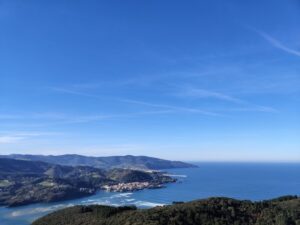
© Lukas Tacke Genannt Unterberg
that case. However, Bilbao is part of the former Basque-county. Even if it is technically Spain, the people are often quite proud of their heritage. Some might take it as an insult, if you call them Spaniards. Additionally, the Basque language is very prominent. You will hear it on the streets and read it a lot on signs. It is very different from Spanish, so don’t be fooled thinking it is just some form of dialect you might be able to understand! All in all I must say, people were very welcoming and most of the time happy to help and communicate, even if there isn’t actually a common language between you. The level of English capabilities is very low in that area, so basics in Spanish or Basque can be very helpful.
Day to day life:
Coming from the culture, food plays a very significant role there. Pintxos (A slice of bread with ANY savory toping you can think of) might be the most prominent one. You can take them for lunch or in the evening with some drinks. Since the city is next to the ocean, fish and other seafoods are integrated in a lot of dishes. If you are a vegetarian or a vegan, it might be hard for you. In more traditional restaurants the vegetarian dish is just a salad or something along that line, so you might want to go to more modern places.
When it comes to going out in the night, Bilbao has a lot to offer. Especially in the casco Viejo (old town) the bar density is very high. But also throughout other parts of the city, you will always find a nice place to grab a beer or a Kalimotxo (popular Basque drink, red wine with cola) and some Pintxos. The club landscape is definitely more restricted. For most clubs, you have to love reggeaton, since it will be played the whole night. But there are also some clubs, where the music choices are more diverse (strong recommend for “Sala Sonora” for Saturdays).
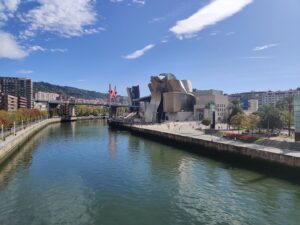
© Lukas Tacke Genannt Unterberg
Public transport is ridiculously cheap and easy in Bilbao. You go to any bigger metro station and buy a “Barik Card”, on which you then can load money. From then on, you just touch-and-go for trains, buses and the metro for prices mostly below 50 cents per ride. The metro also goes all the way to the ocean. Plentzia and Sopella are the beaches reachable by metro I recommend the most. If you want to explore the area, for hikes or to visit other towns nearby, going by bus (Asta or bizkaibus) is a very good option. Most beautiful places I have seen are: San Sebastian, Gangekogorta and the Urdaibai area.
When it comes to work life, in my case it was very similar to my experiences in German companies. Similar working hours, with maybe a longer lunch break and in my case an amazing office climate. My co-workers were always happy to help with tasks or problems at work, but also with recommendations what to do in the area on weekends or which restaurant to go to.
An incredible experience in Norway
- Psychology M.Sc.
- Norway, Tromso
- The Arctic University of Norway (UiT)
- 12.09.22-01.12.22
My experiences:
I recently completed a three-month internship at the UiT in Tromso, Norway during the fall. Overall, it was an incredible experience that I would highly recommend to anyone looking for an opportunity to gain valuable work experience while immersing themselves in a new culture.
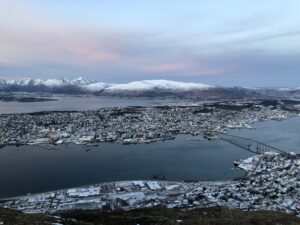
© Anton Koger
One of the biggest challenges I faced during my time in Tromso was finding social connections with native Norwegians. The city is quite small, and many locals tend to stick to their own social circles. However, I found that joining clubs and organizations related to my interests was a great way to meet new people and make friends. Additionally, the university has a very active international community, so it was easy to connect with other students from around the world.
The weather in Tromso can be quite challenging, especially during the fall when the days are short and the nights are long. However, the natural beauty of the area more than makes up for it. The scenery is absolutely breathtaking and there are plenty of opportunities to explore the great outdoors. One thing to keep in mind is that the lack of sunlight can be quite difficult to adjust to, so it’s important to make sure to get outside and soak up some sun whenever possible.
The university itself is quite international, with students and staff from all over the world. This made for a very diverse and stimulating learning environment. The work I did during my internship was very interesting and I felt like I was able to make a meaningful contribution to the research project I was working on.
As a secret tip, I would highly recommend visiting the PUST sauna in the harbour. It’s a unique experience where you can jump into the icy Arctic sea after sauna, it’s a great way to invigorate the body and mind.
In conclusion, my internship at the UiT in Tromso was an incredible experience that I would highly recommend to anyone looking for a unique opportunity to gain valuable work experience, immerse themselves in a new culture and enjoy the beautiful nature. The difficulty to find social contacts with locals can be challenging but with a bit of effort it’s totally worth it. The weather and nature are beautiful, but the lack of sunlight can be challenging. The university is very international and the work you did was very interesting. And don’t forget to check out the PUST sauna in the harbour where you can jump in the arctic sea.
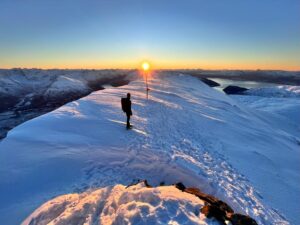
© Anton Koger
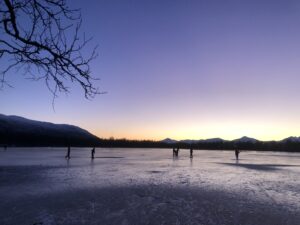
© Anton Koger
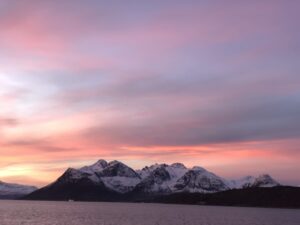
© Anton Koger
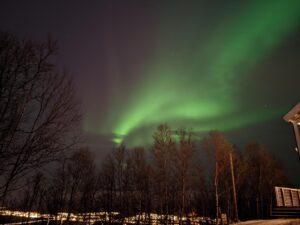
© Anton Koger
My stay in Vienna – a truly transformative experience
- Business Administration and Engineering: Mechanical Engineering B.Sc.
- Austria, Vienna
- Austrian Institute of Technology
- 09/22 – 12/22
My name is Eva, and I spent September till December 2022 in Vienna doing an internship at a non-university research Institution, in the area of energy technology.
My half year Erasmus experience in Vienna was an incredible journey that completely exceeded my expectations. I arrived in the city in September, feeling a mix of excitement and nervousness. I didn’t know anyone in Vienna, and I was worried about how I would make friends and adjust to living in a new country. But from the moment I arrived, I was pleasantly surprised by how welcoming and friendly everyone was. I really fell in love with the beautiful city of Vienna. To be honest, I was obsessed to do my internship in this city. I have never been there before, but my sister who is currently living in Zurich (I am a bit of a fan of this city as well) told me it is almost as beautiful and a lot cheaper. Spoiler: it is definitely more livable as a student because you can actually afford activities. The cost of living is not as cheap as in Aachen, but still within the range of big cities like Munich or Hamburg.
One of the first things I noticed about Vienna was its stunning architecture. The city is filled with gorgeous buildings and landmarks. I spent many afternoons wandering the streets, taking in the sights and soaking up the rich culture of the city.
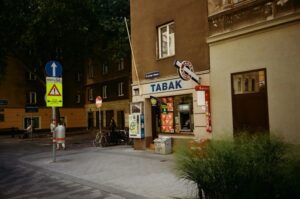
© Eva Paeffgen
In Vienna there are no kiosks, so everywhere are little “Trafiks“ which look really cute. If you want to get a beer in the evening, it is difficult, because supermarkets are closing at 8 pm. But you always can get one at a Würstelstand. My favorite one is the `Wiener Würstelstand´ in Pfeilgasse crossing Strozzigasse. I can recommend the vegan bosna. On the weekend they do organize little events with pretty cool live music.
I was really lucky! In my office I sat only with interns, bachelors students, masters students and PhD students. So it did not take long till we went on for a beer or other activities. My colleagues and I went bouldern. The company were paying half of the price to support sport activities. We also went for paddle, weird sport.
It was also really affordable to do some yoga, in the “oneYoga“ studio it is possible to test all classes for 30 euro for one month after that it costs 90 euro what’s still okay if you go three times a week.
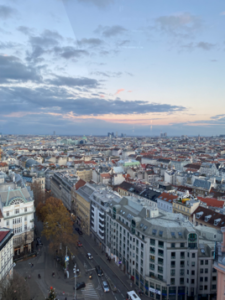
© Eva Paeffgen
I was living in a shared flat with another girl, I found the place on WG-gesucht. It is not easy to find something, but that’s only because no flats are rented with furniture. Everyone else I have met said if you are staying longer, the market really is alright because of social housing. Our flat was in the 8th Bezirk Josefstadt, I would recommend living in the area. It took me 35 minutes to work by train but only a 10 minute walk to get in the city or in the 7th Bezirk which is absolutely my favorite. Full of little restaurants, cute boutiques and nice bars. Maybe a few recommendations: Bars: Espressobar, Cafe Anno, Cafe Benno (they have a lot of games, and you can eat really good kasespätze there). Breakfast: Cafe der Provinz, all you can eat for 18 euro, with a good quality of food, most of them vegetarian and a lot of vegan stuff. Party: there is a website called Vienna wurstelstand -making the most out of Vienna and life. Every month they make recommendations about cool events. My friends and I did a lot of it. Went to art galleries, little concerts or parties. It is also nice to get to know Vienna, so take a look. Restaurants: pizza bussi ciao, mamamon thai or nguyens pho haus.
The picture on the left was taken from the top of the “Haus des Meeres“, you can get up there for free, but it is also possible to have a drink or eat something there. I would go up for the view and get a beer in the area, there are a lot of little cute bars around.
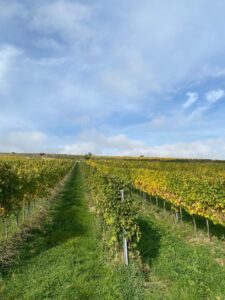
© Eva Paeffgen
If you are also going in winter, you should take a walk on the Kalenberg, it is not far from the city and for me, it was really important sometimes to get some nature and fresh air between all these massive and impressive buildings. There are a lot of Heurigen (vine farmers that are selling between their fields) you can drink „Sturm“ and with good weather you get a beautiful view over the city.
I also had the chance to travel on the weekends. I went to Bratislava which is worth a visit, it is only two hours by train and the city has much to offer. Budapest is a four hour trip, in my opinion you have to stay overnight to make it worthwhile.
Last thing: withdrawing money costs fees, but you can get it for free from the supermarkets.
Overall, my half year Erasmus experience in Vienna was a truly transformative experience. I grew as a person and learned so much about myself and the world around me. I am so grateful for the opportunity to do my internship abroad and to have had the chance to live in such a beautiful and culturally rich city. I will always treasure the memories I made in Vienna and I hope to visit again someday.
My experiences in Oslo
- Molecular and Applied Biotechnology (MA)
- Norway, Oslo
- University of Oslo (UiO)
- 01/10–30/11/2022
I completed a two-month research internship at the Department of Biomaterials of the University of Oslo (UiO). In the following, I would like to tell you about my experiences before and during my stay.
Finding an internship and an accommodation
Although my home university, RWTH Aachen University, does not have an Erasmus partnership with UiO, I came into contact with the institute through my student assistant supervisor, who completed his Bachelor’s thesis there. After a lot of back and forth about the date and topic of the internship, writing a project plan and applying for accreditation of the internship at my home university, the big challenge of finding a place to live began. Unfortunately, my application for student accommodation with SiO, the student organisation in Oslo, was rejected – probably because of my short period of stay – and I had to look for accommodation on the private market. I sent many requests on finn.no and hybel.no, most of which I didn’t even get an answer to, but in the end I had found a room in a 2-person shared flat and nothing stood in the way of my internship. To get there, I decided to go green and first took the train to Copenhagen, where I had a one-day stopover, and then continued by Flixbus through Sweden to Oslo.
The internship and my working environment
My workplace was the Department of Biomaterials at the Institute of Clinical Dentistry, which is part of the University of Oslo. It was essentially a research laboratory of the dental clinic, and most of the research conducted there had to do with dental implants in the broadest sense. I was warmly welcomed and integrated into the team from day one. We were an international research group with a few Norwegians and many scientists from all over the world. Apart from me, there were two other interns, a German and an Italian, and both were Master’s students just like me.
Compared to my experiences in Germany, the hierarchies at our institute were quite low and hardly noticeable, and social interaction was very important: Not only did we have lunch together every day, but we also had many nice conversations, especially on the days when someone had brought a cake or something typical from their home country after visiting or receiving visitors. Sometimes we also organised social events – for example, an international lunch on United Nations Day on 24 October: Everyone was assigned a country from which they had to cook and bring something typical. My country was Tanzania and I made vitumbua (coconut rice pancakes), a popular street food. Before Christmas, socialising became even more important, so on the last day of my internship, I sat in the lunch room with my supervisor, my professor and some other colleagues and folded paper Christmas stars while eating homemade gingerbread.
Although the working atmosphere was quite relaxed, we not only took breaks and drank coffee (which, by the way, was free for all employees, including interns), but also worked in the lab and were very productive in conducting experiments. My project was about validating a method to study cell adhesion to different surfaces. Since my internship was comparatively short, I already started to conduct my experiments independently after a one-week introduction. I had quite a tough schedule and on some days I had to give up my lunch break for the sake of the experiments, but my colleagues always supported and motivated me, so I was able to overlook this and very much enjoyed going to work. In the end, I had a lot of useful results that hopefully contribute to the progress of research on this topic. However, I did not only work on my project alone, but was also part of a project group in which my internship project was embedded. We had weekly meetings and one week we even had a two-day meeting with partners from other countries, where we shared results of previous research as well as ideas about future research tasks and planned the next steps. Of course, social events were also part of it, and so it happened that we not only played minigolf together, but they also took me to a fine dining restaurant, which was the first time in my life.
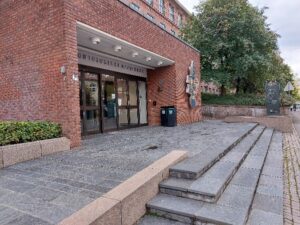 Entrance of the Institute of Clinical Dentistry © Friederike Götz
|
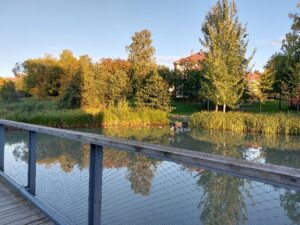 Pond right next to my flat © Friederike Götz |
Financial considerations
The cost of living in Oslo, as in all of Scandinavia, is quite high. My room rental was only two-thirds covered by the Erasmus+ funding, and the costs for daily needs such as food had to be paid on top of this, of course. At first I was a bit shocked by the prices in the supermarkets, which were sometimes twice (or even more) as high as in Germany. I didn’t go to restaurants often, which would have been even more expensive, and I didn’t buy alcohol – thanks to the high taxes on alcohol (and sugar) in Norway. But I have also found some ways to save money in everyday life: In the supermarkets, “Tilbud” is the word that indicates special offers. The weekly offers are often already sold out at the beginning of the week, but if you have the opportunity, it is worth taking it and getting groceries as well as cosmetics and other products much cheaper. Another insider tip is Grønland Frukt Og Grønt (located in Smalgangen 2), a shop where you can buy fruit and vegetables, but also spices and other foodstuffs at reasonable prices.
Free time in Oslo
At the beginning of the internship, the weather was still quite nice and I often explored the city after work and at the weekends. I had a student travel ticket that allowed me to drive all around the city and explore the city centre, the many parks, the harbour and lots of other sights. Since I love sports and play tennis in Germany, I didn’t want to give it up in Oslo either. There was a Facebook group to find tennis partners – which I made use of. Since the court rental was quite expensive, I often played in the morning before work, because then the prices – especially for students – were considerably cheaper. Although my institute had a small gym that I could use, I signed up for SiO Athletica, the student organisation gym that has several locations all over the city. I participated in some courses and on Sundays sometimes in walks that started in Kringsjå, the part of Oslo where the largest student housing is located. There is a beautiful lake there called Sognsvann with many hiking trails around it.
As my internship progressed, the days became noticeably shorter and the weather no longer invited me to spend too much time outside. These times were perfect for sauna visits. Together with some colleagues and friends, I booked a private group sauna that swam in the Oslo Fjord, with a beautiful view of the opera and the possibility to jump into the fjord if it got too hot inside.
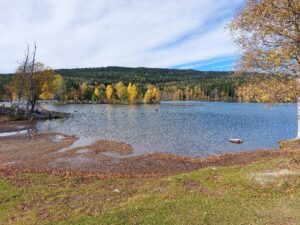
Sognsvann © Friederike Götz
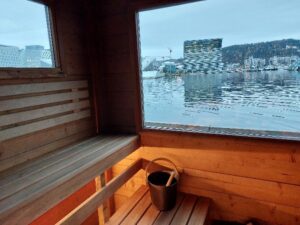
Sauna in the Oslo Fjord © Friederike Götz
Our weekend trip to the Nærøyfjord
One weekend, I went on a trip to the fjord scenery of Norway together with some of my internship colleagues. We rented a car (which was more difficult than expected, as we needed either a credit card or a Norwegian bank account, which neither of us had) and drove almost 8 hours to Voss, a municipality near Bergen. The drive took longer than expected because there was heavy rain that day and several times we came to places where a Norwegian stood next to a car with hazard lights on in the dark in the rain and told us that the road was closed and we had to take another route. In the end, we arrived at our accommodation right on the lake – which was now more or less in the lake, as our basement was flooded. Fortunately, the water had not damaged much and the upper floors were enough for us to sleep. So we were able to enjoy our weekend including an acquaintance with the unpredictable strength of Norwegian nature and a ferry trip on the Nærøyfjord, one of the two UNESCO fjords in Norway. The ferry went from Gudvangen to Flåm, a village famous for its railway, and was pleasantly empty as we were there outside the main season. Although the weather was not the nicest, the view was fantastic and I took many impressive photos that will always remind me of this unique experience.
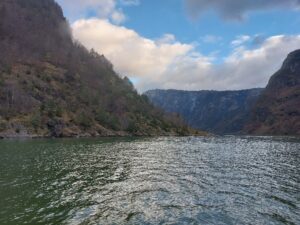
On the ferry in the Nærøyfjord ©Friederike Götz

View of the lake at our accommodation in Voss © Friederike Götz
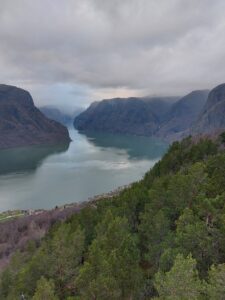
View of the Nærøyfjord from Stegastein viewpoint © Friederike Götz
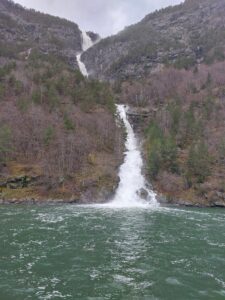
Waterfall in Nærøyfjord © Friederike Götz
My experiences in Sweden – enriching on a professional and personal level
- Construction and Robotics M.Sc.
- Gothenburg, Sweden
- Volvo Group
- March 2022 – December 2022
My decision to seek out an internship abroad was motivated primarily by the opportunity for professional growth. I was motivated to join my host institution- Volvo group in the department of Volvo trucks, for digital and flexible manufacturing plant, for several reasons: Firstly, it is a completely international organization, bringing together diverse collaborations between researchers from all over the world. I was very excited to gain diverse, international, and interdisciplinary perspectives on manufacturing and computer vision as I believed this could offer me a new kind of comprehension of global opportunities. I was also looking forward to building connections with colleagues from my host institute and experiencing first-hand how they approached their work and how their daily working life looked like. Secondly, the fact that the institute was in Gothenburg, Sweden appealed to me as I felt that the new context could offer me unique insights into the research field of Digital productions in real scale industry.
On a personal level, I also believed doing my internship abroad could provide me with the challenge and room for growth offered by new and different surroundings and the opportunity to meet new people. I knew Gothenburg has a beautiful historical center and I was excited to explore the architecture and history of the city. After several months of lockdown due to the Covid-19 pandemic, I found the prospect of new experiences especially energizing and fulfilling.
During my internship I was entrusted with a research project on Computer vison for overhead cameras and AGVs and received the opportunity to work as a researcher with doctorate students and professors from Chalmers University, Gothenburg. Research projects provided me with extremely enriching and fulfilling experiences, in which I learned even more than I could have imagined.
Within the scope of the multiple projects, I explored different methodologies to be able to quantify effectiveness of ARTags- Apriltags, ArucoTags considering light effects, occlusions, speed of detection and tracking. This entailed discussing the advantages and disadvantages of each tags with my team members, critically reviewing and presenting about previous research and learning to practically apply the methods. I worked on strategies for image fusion from multiple cameras and segmentation models as well as computer vision for distributed systems.
Besides cultivating fundamental research competencies, I also developed various soft skills. I cultivated professional and communication skills by interacting with colleagues on a daily basis and working closely together with team members. In doing so, I learned a great amount from my colleagues and their experiences. I both received the opportunity to hold presentations but could also attend lectures given by my colleagues to directly learn from them how to communicate ideas and research findings in an optimized way. I also learned when it was important to ask for help from others and became more confident in taking initiative and contributing my own ideas to the project. By juggling between different tasks and projects, I was able to improve my time management skills and set priorities to become more organized. This also helped me to optimize my work efficiency but also recognize my limits and learn to communicate if I wouldn’t be able to finish a task in the allotted time.
I very much appreciate the large amount of support I received from my host IAESTE and Volvo. I met with my supervisors at least twice a week, sometimes even more frequently and they took a lot of time to guide me and integrate me into the working group as much as possible. My supervisor also often asked me for my opinion and my ideas, which I cannot thank her enough for. Being able to voice my own thoughts and viewpoints proved to be an invaluable opportunity to self-sufficient and independent creative thinking.
Finding accommodation in Gothenburg was most likely one of the most difficult parts of my stay abroad. It was very difficult to find an apartment through online websites from Germany – most of them were in Swedish, many proved to be scams and non-existent and the rest were very expensive. My host institute and IAESTE Gothenburg helped me. My advice would be to start searching for accommodation as early as possible and ask for help from others who are living there.
All of my colleagues at the Volvo trucks are very welcoming and friendly, allowing me to feel completely included and happy during my time there. I gained the opportunity to meet and spend time with many new people. I learned a great amount from them and cherish the memories I have with them. I did get the chance to meet many local people outside of my internship and I was still able to explore a large amount of the city life and surrounding areas with my colleagues, which made me feel more connected to the place I was living in.
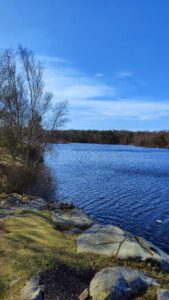
© Gaurav Makwana
In my free time, I would meet with friends from my work and explore the city. I enjoyed going on bike and scooter rides, exploring islands, visiting different historical sites, going to local cafes and restaurants to enjoy FIKA culture, finding the tastiest croissants and travelling to nearby cities or villages. Gothenburg is also close to the sea so I would strongly recommend to head down to all islands and go hiking and swimming there in some of the bluest cold waters you can find. I found the public transport system in Sweden to be very useful for short trips and affordable.
The living costs were in my experience higher in Gothenburg, as compared to Germany. I am therefore very grateful to Erasmus+ for giving me the opportunity to pursue an internship abroad and financially supporting me.
I attended an intercultural seminar and found this to be very helpful to get into a mindset that allows you to make the most out of your time abroad. It also teaches you that any difficulty or hardship that you face in the process can be a valuable learning opportunity. For these reasons, I would recommend it to other students, especially those who have never been abroad before or are looking to gain new insights and perspectives onto their upcoming journey.
My studies and previous research experiences provided me with foundational tools and background knowledge that I could draw from throughout my internship. By being able to apply these skills and competencies, I was able to strengthen and build on to them. This allowed me to cultivate essential research skills and grow confidence in putting them to practice.
Due to the rewarding and fulfilling experience I had during my internship, I feel highly motivated to pursue my studies and to maximize the insights I gain from my courses and professors. The experience also incentivized a future career in Computer vision and Digital manufacturing. Through my internship I realized how important it is to approach a digitalization topic from different angles and perspectives in order to fully understand it and to be able to implement efficient and safety policy measures aiming to mitigate the problems. This taught me how diverse the field can be and how important it is to think creatively and maintain an open mindset for learning from others, regardless of the stage you are in in your career. This reinforced and strengthened my motivation for pursuing a career in global Digitalization strategies.
In summary, while my expectations that I would learn a great amount about the field of Computer vision and develop professionally were fulfilled, my experience abroad also turned out to be very enriching on a personal level – far more than I had anticipated. During my time in Gothenburg, the new people I met, the unique and historical surroundings of the city and the positive and challenging experiences I was confronted with paved the way for growth and self-development. It also made me more open and adaptable to setbacks and helped shift my perspectives to ones in which I could more easily cope with and learn from mistakes.
I believe challenges during an experience abroad are inevitable but that they ultimately prove to be valuable learning opportunities. As eliminating them is not an option: to reduce problems, I believe it is important to plan as much as possible. In my opinion, however, it is more important to anticipate that unexpected outcomes, both good and bad, are bound to come your way and that the way you deal with them will shape your experience.
If you receive the opportunity to do an internship at the firm like Volvo for Research, I would highly recommend to grab the chance. Volvo for Research is a very open-minded and welcoming institution, tailored towards international cooperation. It is a place that fosters growth and openness. I am very thankful that I was able to spend my ten month internship there and would like to express my sincere gratitude to my supervisor and colleagues at the Volvo trucks, as well as to those at RWTH Aachen supporting the Erasmus+ traineeships abroad.

